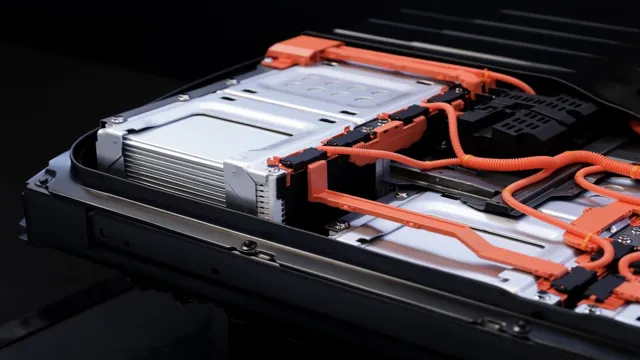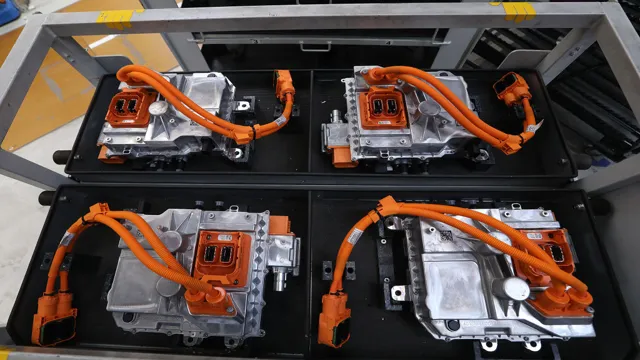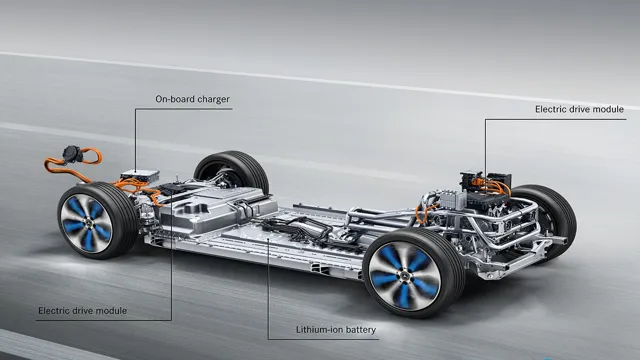Unlocking the Secrets of Electric Car Batteries: How to Extend Their Lifetime for Maximum Efficiency
Have you ever wondered about the lifespan of your electric car battery? It’s a common concern among electric car owners, considering the battery is the most expensive and essential part of the vehicle. The good news is that with proper care and maintenance, electric car batteries can last for a long time. However, the lifespan of electric car batteries can vary depending on several factors, such as usage habits, climate conditions, and charging patterns.
This means that while your neighbor’s electric car battery may last for a decade, yours may need replacing after only a few years. In this blog post, we will explore the different factors that affect the lifespan of electric car batteries and how to maintain them to get the most out of your investment. So, buckle up and let’s take a deep dive into the world of electric car batteries.
Introduction
Electric car batteries have been making headlines for a while now, with many automotive enthusiasts wondering about their lifespan. The truth is, the lifetime of electric car batteries largely depends on several factors, including usage patterns, maintenance, and environmental conditions. Generally speaking, most electric car batteries are designed to last between 100,000 to 200,000 miles or around 8-10 years.
There are, however, some exceptions, with some electric vehicles boasting a battery lifetime of up to 500,000 miles. One thing is clear though, if you want to extend the lifetime of your electric car battery, it’s important to take care of your vehicle and ensure you drive it with care. Proper maintenance, regular charging, and driving at moderate speeds can all help to extend the life of your electric car battery.
In conclusion, while the lifetime of electric car batteries may vary, taking good care of your electric car can help ensure you get the most out of your battery and keep your car running smoothly for years to come.
What is the lifespan of electric car batteries?
Electric car batteries have become an increasingly popular topic of conversation as more drivers make the switch to electric vehicles (EVs). One question that frequently arises is, “what is the lifespan of electric car batteries?” The answer is not as straightforward as one might think, as several factors influence the durability of an EV battery. These include the type of battery, driving habits, environmental conditions, and the manufacturer’s design of the vehicle and battery.
However, in general, most electric car batteries are designed to last at least 100,000 miles. This means that most EV drivers can expect their battery to last for several years before experiencing significant performance degradation. Of course, proper maintenance and care can also help prolong the life of an electric car battery.
As EV technology continues to improve, we can expect battery lifespans to increase even further and become more accessible to a wider audience.
Factors that affect the lifespan of electric car batteries
When it comes to electric cars, their batteries are undoubtedly the life-force that keeps them running. The lifespan of electric car batteries depends on a variety of factors, some of which are within the driver’s control, while others are not. One of the most significant factors that determine the battery’s lifespan is the frequency at which it is charged.
Frequent charging can lead to degradation of the battery over time, reducing its capacity and overall lifespan. Similarly, temperature also plays a crucial role in the lifespan of an electric car battery. Extreme temperatures, whether too hot or too cold, can have a detrimental effect on the battery’s health and can cause it to age prematurely.
Other factors that can impact the battery’s lifespan include the car’s driving habits, weight, and the type of battery chemistry used. By being aware of these factors, electric car owners can take steps to prolong their battery’s lifespan and ensure that their car continues to run smoothly for years to come.
Battery Technology
When it comes to electric car batteries, one question on everyone’s mind is how long they last. The reality is, the lifetime of an electric car battery depends on a variety of factors, including the specific battery chemistry, how the battery is used and maintained, and the overall design of the vehicle. Generally speaking, most electric car batteries are designed to last for at least 100,000 miles before they start to degrade significantly.
However, with proper care and maintenance, many electric car batteries can last well beyond that point. It’s important for electric car owners to understand the unique characteristics of their battery and to work with a reputable mechanic or dealership to ensure proper maintenance and care over the life of the vehicle. So while the lifetime of an electric car battery may vary, with the right approach, electric car owners can enjoy reliable and long-lasting performance from their vehicles.
Different types of battery chemistries
Battery technology has advanced significantly in recent years, and there are several types of battery chemistries that are commonly used in modern-day devices. Lithium-ion (Li-ion) batteries are by far the most popular type of battery and are used in many everyday devices, including smartphones and laptops. Another popular battery chemistry is Nickel-Cadmium (NiCd), which is commonly used in power tools and emergency lighting.
Nickel-Metal Hydride (NiMH) batteries are similar to NiCd batteries but offer higher capacity and are widely used in hybrid vehicles. Lead-acid batteries are one of the oldest battery chemistries and are commonly used in automobiles and backup power systems. Sodium-ion batteries are a newer technology that offers long cycle life and high energy density, making them ideal for use in renewable energy storage systems.
It’s important to understand the different types of battery chemistries when choosing the right battery for your device or application, as they all have unique characteristics and advantages.
How technology advances are affecting battery lifespan
Battery lifespan is a crucial factor in any technological device, and as technology advances, its impact on battery life has become increasingly significant. With the growing popularity of smartphones, laptops, and other portable devices, battery technology has been forced to keep pace with growing user demands for extended use. Lithium-ion batteries, which power most portable devices, have seen major improvements over the years, with increased energy density and longer life cycles.
However, as devices become more powerful and feature-rich, these improvements have only been able to somewhat offset the increased energy demands, meaning that battery life is still a limiting factor for many users. To combat this, researchers are exploring new battery materials and technologies, such as solid-state batteries and new electrodes, which aim to provide higher energy density and faster-charging times. These advancements are likely to have a major impact on battery lifespan, enabling users to enjoy longer and more reliable use of their devices without having to worry about running out of juice.
Battery Maintenance
Taking care of your electric car battery is crucial if you want to ensure a long lifetime for your vehicle. One of the simplest and most important things you can do is to maintain the proper charge level. Overcharging or completely discharging your battery can lead to irreversible damage to the cells, reducing the overall capacity of your battery.
This can be prevented by keeping your battery within the recommended range of charge and avoiding fast charging whenever possible. Another key factor in battery maintenance is keeping it cool. High temperatures can significantly reduce the lifespan of your battery, so it’s essential to park in the shade, avoid leaving your car in direct sunlight, and ensure proper ventilation to prevent overheating.
By following these simple tips, you can extend the longevity of your electric car battery and enjoy hassle-free driving for years to come.
Tips for extending the life of electric car batteries
When it comes to extending the life of an electric car battery, proper maintenance is crucial. One of the key factors in battery maintenance is keeping it charged to the proper level. Fully charging your battery on a regular basis is recommended to maintain good health, but it’s also important to avoid overcharging.
This can lead to a decrease in overall battery life. Another factor to consider is temperature control. Extreme temperatures, both hot and cold, can have a negative impact on your battery’s longevity.
Keeping your electric car in a shaded area or garage during hot weather and using a battery blanket during cold weather can help mitigate these effects. Regular check-ups and maintenance by a qualified technician can also help to identify any issues or potential problems before they become serious. By taking these simple steps, you can extend the life of your electric car battery and get the most out of your investment.
Importance of regular maintenance
Battery maintenance is crucial for the optimal performance and longevity of your vehicle’s battery. Regular battery maintenance ensures that the battery’s charge level is maintained at an appropriate level, which directly impacts its ability to start the engine. Neglecting regular battery maintenance could result in a discharged or dead battery, which can leave you stranded and in need of a jumpstart.
To maintain your battery’s optimal performance, it’s recommended to clean the battery terminals regularly and inspect the battery to ensure it’s secured in place and free from any corrosion. Additionally, you should check the battery’s water level and maintain the recommended level by adding distilled water when necessary. By taking proper care of your vehicle’s battery, you can avoid expensive repair costs and the unnecessary inconvenience of a dead battery.
Replacing Batteries
One of the biggest concerns for anyone considering an electric vehicle is the lifetime of the batteries. While electric car batteries are built to last for many years, there will come a time when they eventually need to be replaced. The good news is that advancements in technology have made battery replacement less daunting than it used to be.
Many automakers have developed more efficient and long-lasting batteries, as well as ways to recycle and repurpose old batteries. In fact, some automakers even offer battery replacement programs as part of their warranty or maintenance package. While it’s important to keep in mind the eventual cost of battery replacement, it’s reassuring to know that there are options available to make the process more affordable and sustainable.
Ultimately, the lifetime of an electric car battery will vary depending on factors such as driving habits, weather conditions, and maintenance, but with proper care, most batteries can last for many years.
When should you replace batteries?
Replacing Batteries Batteries are an integral part of many devices and gadgets we use every day, from our smartphones and laptops to our remote control and wireless mouse. However, just like anything else, batteries have a lifespan and need to be replaced eventually. But when should you replace batteries? The answer depends on several factors, such as the type and age of the battery, the frequency of use, and the demands of the device.
For instance, if you notice that your smartphone’s battery drains faster than usual even after a full charge, it could be a sign that it’s time to replace the battery. Similarly, if your wireless mouse stops working properly or becomes unresponsive, it could be a sign that the battery is running low and needs to be changed. In general, it’s a good idea to replace batteries every 1-2 years, even if they seem to be working well.
This will ensure that your devices function optimally and prevent any potential damage or leakage. So, if you’re wondering when you should replace batteries, keep an eye on their performance and lifespan, and replace them as needed.
Cost and environmental impact of battery replacement
When it comes to replacing batteries, there are a few things to keep in mind. First and foremost, the cost can vary depending on the type of battery and the device it powers. Additionally, the environmental impact of replacing batteries is a concern for many consumers.
Most batteries contain materials that can harm the environment if not disposed of properly. This is why it’s important to recycle batteries whenever possible in order to minimize their impact on the environment. Newer battery technologies, such as lithium-ion batteries, are generally more environmentally friendly than older battery types like nickel-cadmium.
In terms of cost, battery replacement can add up over time, especially if you have multiple devices that require new batteries fairly frequently. It’s important to weigh the cost of replacing batteries against the cost of purchasing new devices with longer-lasting batteries built in. Overall, while battery replacement can be a hassle and a financial burden, it’s important to consider the environmental impact and make responsible choices when it comes to disposing of old batteries.
Conclusion
In conclusion, the lifetime of electric car batteries is a hot topic in the world of sustainable transportation. While many skeptics may argue that their lifespan is too short and not worth the investment, others see the potential in advancements and innovations that could extend their lifespan. Ultimately, it’s important to remember that every battery has its own unique story and lifespan, just like every car or person.
So, let’s charge forward and embrace the electrifying future of automotive technology with a positive attitude and a willingness to adapt to changes!”
FAQs
What is the typical lifetime of electric car batteries?
The lifetime of electric car batteries varies depending on factors such as usage, temperature, and storage conditions. Generally, electric car batteries last between 8-10 years or up to 100,000-150,000 miles.
How can I extend the lifetime of my electric car battery?
To extend the lifetime of your electric car battery, you can follow best practices such as avoiding extreme temperatures, avoiding deep discharges, and keeping the battery charged between 20-80%.
What happens to an electric car battery at the end of its lifetime?
At the end of its lifetime, an electric car battery can be recycled or repurposed. Some manufacturers offer buyback programs for used batteries, which can be refurbished and resold.
Is the lifetime of an electric car battery affected by fast charging?
Fast charging can shorten the lifetime of an electric car battery due to the high levels of heat generated during the process. However, newer battery technologies and better temperature management systems are reducing this impact.






